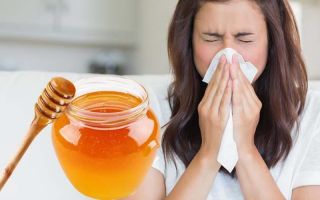Honey is on the list of the most powerful allergens, so this product will be discussed in our article today. What is the danger of honey, is honey possible for allergies, why do allergy sufferers call it “sweet death” and what to do to save a life if, nevertheless, the components of honey turned out to be on the tongue of an allergic person - all the answers are collected here. The danger of honey desserts for diabetics and allergy sufferers has long been experimentally confirmed and scientifically proven. The amount of glucose is to blame. It is worth noting that not all varieties of honey cause the same strong reaction. Acacia and buckwheat honey are considered less dangerous. However, caution must also be observed when eating seemingly harmless varieties.
Honey as the strongest allergen can cause anaphylactic shock in an allergic person. Getting on the tongue even in small doses, honey leads to suffocation, sore throat, coughing fits and other unpleasant symptoms. The first aid, of course, is to take antihistamines that stop an allergy attack. It will help as an additional measure and a flow of fresh air, spraying the patient's face with cold water. The first step is to seek medical help. Honey usually gives a reaction 30-40 minutes after eating it.
An allergy to honey in a child is especially pronounced. This is due to the fact that in an adult, the immune system has already developed, so it can fight back against the allergen. What can not be said about the weak immunity of the child. Vomiting and loose stools can be symptoms of a childhood allergy to honey.
Symptoms
Parents should be able to recognize the first signs of an allergy to any product, including the symptoms of a honey allergy. These may be the following signs:
- diathesis and rash in different locations: from face to body;
- itching;
- swelling of the mucous membranes;
- nausea and vomiting;
- the appearance of red scaly spots on the body and face;
- nasal congestion, runny nose, sneezing;
- cough and sore throat;
- hives;
- other individual manifestations.
Treatment
Before starting any treatment, it is worth making sure that the diagnosis is accurate. If you have a tendency to react to certain foods, you probably already know that you are better off keeping a food diary. So you can control the disease and notice the onset of food allergies in time. Treatment is provided by taking such effective allergy remedies as: Tavegil, Suprastin, Zirtek, Zodak. Complex treatment also involves the external use of ointments and gels that soothe itching of the skin. Here you can apply Fenistil gel.
Important!!! Allergy can manifest itself not only when eating honey directly, but also when in contact with honey-containing products. For example, a honey-scented scrub in a bath or using a honey shampoo in your favorite bath can result in redness or other manifestations of allergies on the skin. Therefore, when choosing cosmetic and hygiene products, be sure to give preference to products that are marked “hypoallergenic”.
Diagnostics
Choosing a good allergy doctor is the first step towards successful allergy management. Look for that specialist who will accurately answer you the question of whether you and your children can be allergic to honey, how to treat this ailment and how to avoid serious complications. Diagnosis consists in a blood test, a prick test that reveals the body's reaction to an allergen. Based on the results of the examination, competent effective treatment will be prescribed.
Allergy to honey, like any other allergy, affects the body. The immune system of the body immediately responds to the stimulus.
There is an allergy to honey, passing latently (hidden). In other words, a person learns about an allergy to honey only when they consume a huge amount of the allergen. In small doses, honey may be safe for some patients. All this is purely individual.
Honey for allergies can be completely excluded or replaced with other safe sweets.
Is there an allergy to honey that disappears with age? It is impossible to unequivocally answer this question without an in-depth analysis of your blood, carried out at least once a year. Of course, there is such a thing as "outgrow the allergy."
An allergic child, having matured, may no longer experience allergy symptoms. And it happens vice versa. The symptoms will only get worse.
Whether honey causes allergies in you or not - regardless of your answer, we recommend our readers to observe the measure in everything, monitor their health, take care of themselves and their loved ones. Healthy eating and healthy eating habits have never harmed anyone. Be attentive to the signals of your body, living in harmony with the outside world.
Attention:
Eating artificial honey for allergies does not solve the problem. Artificial honey is one of the types of fragrant brew. In its manufacture, all kinds of sweet types of berries and fragrant fruits are used. The smell and taste are naturally different from natural bee honey. However, in artificial honey there are no traces of pollen and nectar processing by bees. Industrial honey does not convey all the richness of the taste of natural honey, and even more so, does not have all the useful properties of a natural product. Honey is not included in the list of essential foods, so a complete rejection of this product should not drastically affect your diet. If you're a honey confectioner and your allergy has taken you by surprise, try new culinary arts and look for new recipes without the addition of honey. Think about your health.


